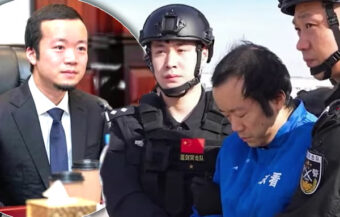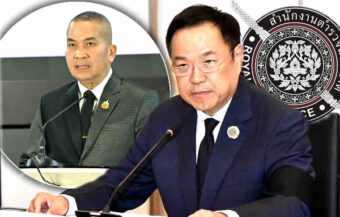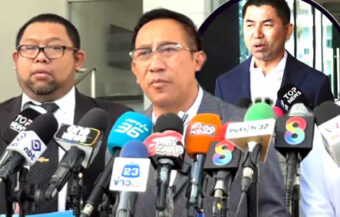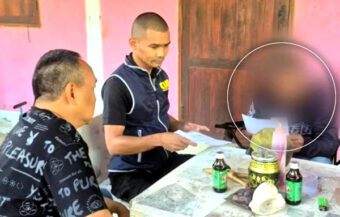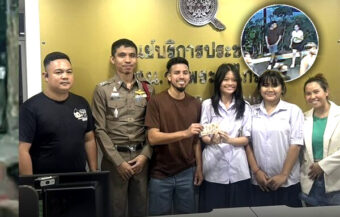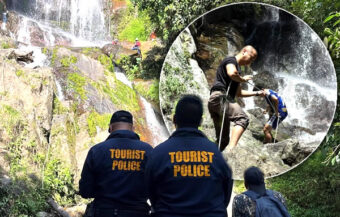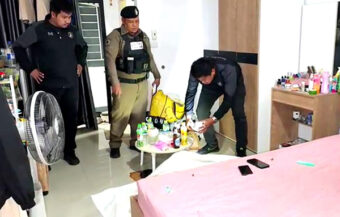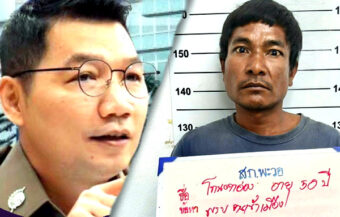The Thai military accuses Cambodia of planting new Russian-made landmines that injured 3 soldiers near the border. Over 100 mines are believed to have been planted in Thai territory. Thailand demands accountability under the Ottawa Convention and plans UN action amid rising border tensions.
Thai military investigators have confirmed that the landmines which wounded three Thai soldiers last Wednesday were newly planted and of Russian origin. The Royal Thai Army is now demanding accountability, urging a firm yet measured response under the Ottawa Convention — a treaty both Thailand and Cambodia have signed. Officials say the evidence is clear: over 100 mines were likely laid by Cambodian forces ahead of the deadly May 28 clash, which killed a Cambodian soldier and triggered the latest surge in border tensions. The Thai military calls the act a serious provocation — and a blatant breach of international law.
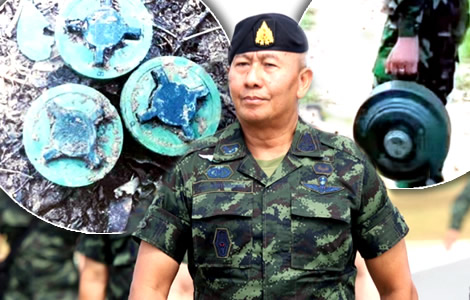
Tensions have intensified along the Thai-Cambodian border after a landmine blast injured three Thai soldiers near Chong Bok in Ubon Ratchathani on July 17. The Royal Thai Army now believes the mines were recently planted by Cambodian forces, despite repeated denials from Phnom Penh.
According to Thai investigators, the devices were not remnants from past conflicts. Instead, they appear to have been deployed in recent weeks. The discovery has sparked military activity and diplomatic protests by Thai authorities.
On July 19, Major General Winthai Suvari, Army spokesman, confirmed that the mines were new. He cited findings from Humanitarian Mine Action Unit 3, which examined the blast site. Eight TM-57 landmines were recovered from two separate locations within Thai territory.
Thai Army confirms new landmines were planted inside Thai territory in deliberate and strategic locations
At the first site, three mines were found laid in a triangle, spaced 40 centimeters apart. At the second, five more mines were discovered, this time 90 centimeters apart. They were lightly covered with leaves but clearly visible upon close inspection.
Importantly, these areas had already been demined and officially declared safe by Thai forces. The reappearance of mines indicates deliberate action.
Moreover, some mines were found 100 to 150 meters beyond Cambodia’s last known military positions. This has led Thai officials to conclude the planting was intentional and recent.
General Pana Klaewplodtook, Army Commander-in-Chief, stated that the findings justify a firm response. “Thailand has the right to act, both militarily and diplomatically,” he said. “We will protect our sovereignty with care and caution.”
Furthermore, he stressed that the army would carry out its duty with restraint and according to international norms. “We seek justice, not escalation,” he added.
Thailand files protest under Ottawa Convention and considers escalation to the United Nations for action
The Thai Ministry of Foreign Affairs has lodged a formal protest through the channels provided by the Ottawa Convention. This treaty, to which both Thailand and Cambodia are parties, bans the use of anti-personnel landmines.
In addition, Thailand plans to raise the issue with the United Nations. Officials hope for international pressure to hold Cambodia accountable.
Meanwhile, the Cambodian government has strongly denied the allegations. In a written statement, Phnom Penh reiterated its respect for the Ottawa Convention. It also called for cooperation with Thailand to investigate the origin of the explosives.
However, new evidence has further strained the situation. A video clip circulated on social media on July 19 appears to show a Cambodian soldier planting a TM-57 mine near the border. According to military sources, the footage was posted online by Cambodian users, then quickly deleted.
The Thai side claims the clip is clear proof of recent violations. “This directly contradicts Cambodia’s public denials,” one official said. The army now considers the video decisive.
Cambodia denies wrongdoing but new video footage raises fresh doubts about its commitment to mine treaty
The Cambodian statement included several key points. First, it emphasized that Cambodia has suffered extensively from landmines in the past. Second, it stressed Cambodia’s historical role in advocating for mine-free zones.
Under the leadership of Prime Minister Hun Manet and his predecessor, Hun Sen, Cambodia has hosted several high-profile mine eradication summits. Notably, it chaired the 11th Meeting of States Parties to the Ottawa Convention and the 2024 Siem Reap–Angkor Summit.
Nevertheless, Thai authorities argue that recent actions do not reflect those commitments. According to Lt. Gen. Boonsin Phadklang, Commander of the 2nd Army Region, the mine-laying clearly violates the convention.
“The mines are not old,” he said during a press briefing at the Suranaree Task Force headquarters on July 18. “They were placed with precision and covered just enough to hide them. They are new, not remnants.”
Technical findings confirm mines are freshly planted and could only have been placed from the Cambodian side
Col. Somchok Chantasi, head of the mine disposal unit, provided additional technical details. “The devices still had fresh paint markings. Old mines would be rusted or buried under weeds,” he explained.
Crucially, some of the mines were located in areas where Thai troops had recently withdrawn. Thai military analysts believe the mines were planted during this window of reduced patrols.
Therefore, the army believes the Cambodian side infiltrated Thai territory to lay the devices. “There’s no way our own troops would plant mines where we patrol,” Lt. Gen. Boonsin said. “It’s impossible and against every rule of military conduct.”
Boonsin dismissed Cambodian suggestions that Thai forces may have laid the mines themselves. “No Thai commander would risk his own men. That would be reckless and disgraceful,” he said.
He confirmed that the 2nd Army Region is now responsible for removing all remaining landmines. This will proceed without waiting for central government orders. “We don’t need permission. This is a tactical matter,” he said firmly.
More than 100 landmines believed planted as Thai army launches full border sweep and road construction
The Thai military estimates that more than 100 TM-57 landmines could still be hidden in the border zone. Most are believed to be located within Thai territory. Engineers are being mobilized to begin full-scale clearance operations.
Furthermore, the military is considering building new roads and fencing to secure the area. However, Boonsin warned that fencing is politically sensitive. “Both countries must agree before fences go up,” he said. “Unilateral action risks confrontation.”
The disputed area around Chong Bok is one of four contentious zones. Others include Prasat Ta Muen Thom, Prasat Ta Kwai, and Prasat Ta Muen Tod. All are located along the Thai-Cambodian border and have been the subject of past tensions.
When asked if the landmine incident could serve as a pretext for fencing the area, Boonsin was cautious. “Yes, it could,” he said. “But Cambodia still rejects Thai sovereignty there. Any move must be well thought out.”
Cambodian soldiers seen entering in civilian clothes as Thai army warns against provocation and miscalculation
He also acknowledged that some Cambodian soldiers have entered contested zones wearing civilian clothes. Recently, such an incident occurred at the Ta Muen Thom temple. According to Thai officials, this was likely a soft assertion of presence.
Boonsin said he has instructed his troops to respond calmly but firmly. “We cannot let things spiral,” he warned. “But we also cannot be passive.”
The commander emphasised that while the situation is serious, it has not yet reached the point of civilian evacuation. “We are still in control. But we must act now to prevent escalation.”
Importantly, Boonsin reiterated that the military’s conflict is not with Cambodian civilians. “The people of both countries are not enemies,” he said. “We must not let political tensions turn into public hatred.”
Thai army urges calm at home but warns that denial by Cambodia will not stop countermeasures on the ground
He called on Thai citizens to remain patient and united. “We are managing the situation responsibly,” he said. “The Royal Thai Army and the government are working closely to protect the border.”
He added that a diplomatic solution remains possible. However, the military will continue to respond firmly on the ground. “If Cambodia denies responsibility, we still must clear the mines,” he said. “We owe that to our men and our nation.”
As for international reaction, Thai officials hope the evidence, including video footage, will shift global opinion. “We will not allow facts to be distorted,” the army spokesman said. “The truth must be seen and acknowledged.”
Thai soldier loses leg stepping on landmine on patrol at the Thai Cambodian border in Ubon Ratchathani
Army private who lost foot promoted to Sergeant as probe into the origin of the Russian mine is opened
Meanwhile, Thai authorities view the mine-laying as a serious provocation. However, they remain committed to handling the issue through legal, military and diplomatic channels.
For now, the land near Chong Bok remains dangerous. Teams are working urgently to make it safe again. The Thai military says it will continue its efforts until the border is cleared and fully secured.
Join the Thai News forum, follow Thai Examiner on Facebook here
Receive all our stories as they come out on Telegram here
Follow Thai Examiner here
Further reading:
Dangerous impasse between Thailand and Cambodia as PM rules out International Court of Justice (ICJ)
Hun Manet confirms Cambodia ultimately may decide to send border dispute with Thailand to the Hague
Khmer soldier killed in deadly gunfire between Thai and Cambodian armies near Ubon Ratchathani
Thaksin to address state board on drug suppression despite howls of protest from human rights groups
Health Minister Somsak launches regulatory blitz to outlaw non-medical cannabis use within 40 days





